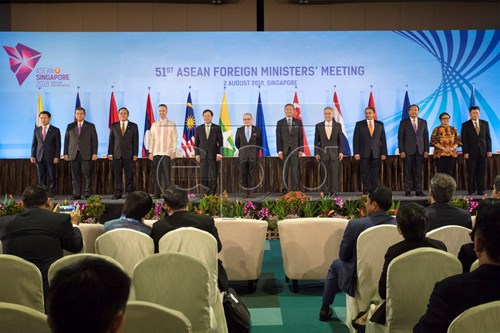The Foreign Ministers of the 10 ASEAN countries also reached consensus on building a resilient and innovative ASEAN on the foundation of the implementation of reached targets and initiatives, including the launch of the ASEAN Smart Cities Network, cooperation in cyber security and harmonisation of legal frameworks.
The minister agreed to continue with efforts for the effective implementation of the ASEAN Community Vision 2025 and blueprints for building the Community’s three pillars, narrowing the development gap, enhancing connectivity, and to promote complementarities between those blueprints with the United Nations 2030 Agenda for Sustainable Development.
    |
 |
|
At the 51st ASEAN Foreign Ministers’ Meeting. Photo: epa.eu |
In the context of natural disasters in the region, including the dam collapse in Laos, the ministers called for increasing mutual cooperation and support, including the role of the AHA Centre.
On the bloc’s external relations, the ministers acknowledged progress in cooperation between ASEAN and its partners and agreed to further bolster the ties in the time ahead.
The ministers agreed to build the ASEAN-China Strategic Partnership Vision 2030 to be adopted at the 21st ASEAN-China Summit in November this year, convene the 21st ASEAN-Japan Summit to commemorate the 45th anniversary of ASEAN-Japan ties also in November, and hold the 4th ASEAN-Russia Summit at the end of this year.
On the occasion, the ministers signed documents to extend the Treaty of Amity and Cooperation with Argentina and Iran, bringing the number of signatories to 37.
Regarding the East Sea, the ASEAN ministers reaffirmed the importance of maintaining peace, security, stability, safety and freedom of navigation and overflight above the East Sea. They took note of concerns on the land reclamations and activities in the area, which have eroded trust and confidence, and may undermine peace, security and stability in the region.
The ministers urged self-restraint in the conduct of activities and avoid actions that may further complicate the situation and escalate tension in the East Sea, and the peaceful settlement of disputes in accordance with international law, including the 1982 UNCLOS, along with the full and effective implementation of the 2002 Declaration on the Conduct of Parties in the East Sea (DOC).
They took note of the progress of the negotiations toward an effective Code of Conduct in the East Sea (COC), including the agreement on a Single Draft COC Negotiating Text, and emphasised the need to maintain an environment conducive to the COC negotiations.
Addressing the AMM 51 and related meetings, Deputy Prime Minister and Foreign Minister Pham Binh Minh underlined the multi-faceted progresses in ASEAN cooperation and in cooperation between ASEAN and partners.
Amidst rapid and unforeseeable developments in the regional and global situations, the Vietnamese Deputy PM proposed that ASEAN focus more on intra-bloc cooperation.
He also suggested that the bloc maintain solidarity and its central role, while enhancing its collective capacity to respond to arising challenges.
Deputy PM Minh also shared concerns about recent activities in the waters, including militarisation, which he said affected peace, security in the region and trust among countries. He urged concerned parties to restrain themselves, avoid actions that can complicate the situation while adhering to agreed principles and commitments, including those mentioned in the DOC, thus maintaining an environment inductive for the negotiation of the COC.
Source: VNA